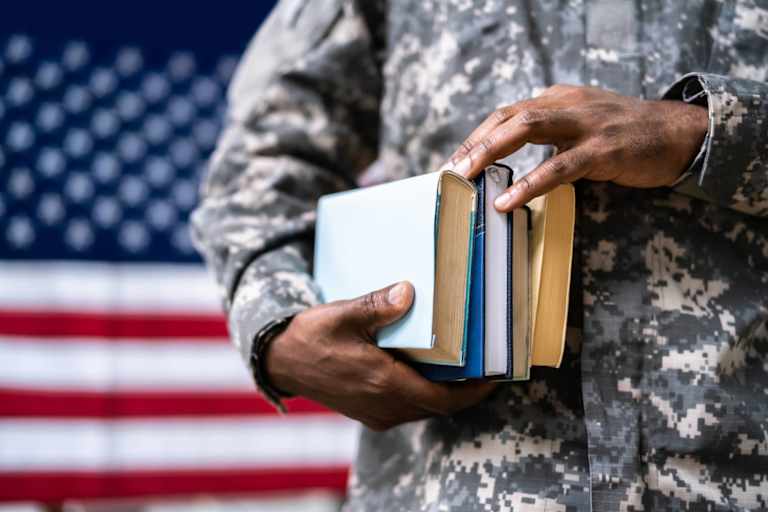Guide to the ROTC Program
- ROTC trains college students for service in the Army, Navy, or Air Force.
- By joining ROTC, you can benefit from professional opportunities and scholarships.
- The ROTC program prepares you to start your military career at the officer level.
For many interested college students, the ROTC program provides a way to pay for college and advance toward professional and personal goals. More than 1,700 colleges nationwide offer ROTC programs, which prepare you for officer roles within the Army, Navy, or Air Force.
You can begin ROTC even earlier, as many high schools offer Junior ROTC (JROTC) programs. In addition to leading to officer positions in the military, these programs teach important soft skills like leadership, teamwork, and dedication. Even if you don’t plan on a lifelong military career, these skills can increase your odds of success in almost any field.
In this guide, we cover what the ROTC program entails and why you might consider joining.
What Is the ROTC Program?
ROTC stands for Reserve Officers’ Training Corps. The program was created after the passage of the National Defense Act of 1916, which led to the establishment of both the ROTC and JROTC programs. This allowed high schools and colleges to get military training instructors and funding from a single organization.
The ROTC program aims to train college students for future service in branches of the U.S. military. The Army, Air Force, and Navy each have their own ROTC programs.
If you’re still in high school and interested in joining the U.S. Armed Forces in the future, you can gain exposure to the rigors of military training through a JROTC program.
Why Join an ROTC Program?
There are many reasons to consider joining a JROTC or ROTC program.
Some students join ROTC to follow in the footsteps of a family member. Some join for the professional opportunities you get after graduating. Finally, some are drawn to ROTC out of patriotism and a desire to serve their country.
The ROTC program offers college students many benefits, including:
- The opportunity to develop technical and leadership skills
- A structured path to a career after college
- Specialized professional training for military officer positions
- ROTC scholarships that cover tuition, fees, books, and other necessities
- Long-term career guidance and continued professional education
Your school certifying official (SCO) can help you determine whether your involvement in the ROTC program will affect your desired major. ROTC training times may interfere with some of the courses you need to take, but your academic advisor should be able to help you find a solution.
ROTC recruiters can answer all of your questions about the program itself. Along with SCOs, recruiters can provide information on potential scholarships and the program’s time commitment.
| Army | Navy and Marine Corps | Air Force | |
|---|---|---|---|
| Availability | 1,000+ colleges | 170+ colleges (Navy); 77 colleges (Marine Corps) | Nearly 1,100 colleges |
| Training Topics | Army leadership, military tactics, principles of war, combat survival training | Summer cruise training, surface warfare orientation, flight time on Navy aircraft, maritime self-defense | Laws of armed conflict, international security, aerospace studies, field training |
| Service Obligations | Minimum 4 years, depending on scholarship acceptance | 3-8 years of active military service, depending on scholarship acceptance and degree level | 4-10 years of active duty, depending on contract cadet appointment |
| Sample Career Specialties | Infantry, military intelligence, civil affairs, U.S. Army Medical Corps | Submarine, explosive ordinance disposal, U.S. Marine Corps, U.S. Navy Nurse Corps | Air battle management, aircraft maintenance, cyberspace operations, piloting, tactical air control |
Source: Today’s Military, U.S. Department of Defense
High School ROTC Program
Many U.S. high schools offer JROTC programs run by various military branches. These programs last 2-4 years. You may be eligible to enroll in your school’s JROTC program starting in 9th grade.
We’ve provided links below to the detailed curriculum offerings for each type of JROTC program, along with details about co-curricular activities you can participate in as a high school cadet.
- Army: Raider Fitness Challenges, drill formations, air rifle competitions, first aid for emergencies
- Navy: Navigation instruction, communication electronics, drill ceremonies, ship handling, naval science
- Air Force: Flying model programs, drill formations, flight science, management principles, astronomy
- Marine Corps: Color guard, drill formations, air riflery training, volunteer service, color guard ceremonies
- Coast Guard: Nautical science, drill formations, calisthenics activities
As a high school student, you can still enter a college ROTC program, even if you didn’t participate in JROTC. Start researching prospective ROTC programs early so you have time to apply for training and scholarships.
College ROTC Program
Once in college, you can explore different military branches by enrolling in an ROTC program through the Army, Navy (with Marine Corps), or Air Force.
While the U.S. Coast Guard doesn’t have an ROTC program, you can explore a similar training program: College Student Pre-Commissioning Initiative.
Below are some of the admission and program requirements for each type of ROTC program.
| Army | Navy and Marine Corps | Air Force | |
|---|---|---|---|
| Physical Fitness | Pass an Army Physical Fitness Test with at least 60 points awarded through three events. | Pass the Applicant Fitness Assessment. | Score at least 75 points on the Physical Fitness Test twice a year. Non-scholarship cadets must take the test but do not need to pass |
| Academics | Complete one Army ROTC elective and lab each semester. | Complete required courses in calculus, physics, English, national security, cultural studies, and naval science. | Must earn a C- grade or higher in aerospace courses, pass leadership labs, and complete the Air Force Officer Qualifying Test during your junior year. |
| Alcohol and Drugs | No illegal drug use. Legal alcohol consumption permitted. | Medical history of illegal alcohol and drug use disqualifies applicants. No illegal drug use. Legal alcohol consumption permitted while off duty. | No illegal drug use. |
Academics
Initial acceptance into an ROTC program does not guarantee continued scholarship benefits. You must abide by strict academic standards to continue getting funding throughout college. Each military branch has different rules around courses, majors, and minimum grades.
Generally, the Army ROTC (AROTC) has the least stringent scholarship programs, allowing you to explore nearly any major and take two ROTC courses of your choosing each semester.
The Navy ROTC (NROTC) and Air Force ROTC (AFROTC) are more selective about funding majors in specific fields. These military branches tend to prioritize scholarships for students majoring in STEM or a foreign language.
Disenrollment Repercussions
Once you accept an ROTC scholarship, you are legally required to serve in the military for a specific number of years, as defined by your scholarship, degree program, and career path.
Before you sign this contract, consider how military service fits into your life and future goals and whether it’s a long-term commitment you’re willing to make.
If you fail to fulfill your ROTC academic program or active-duty commitment, you could be disenrolled. You could face serious repercussions if you fail to perform your active-service duties. Disenrolled students may be held to additional active-duty order determinations and repayment of ROTC financial assistance.
Military Service Commitment
Once you earn your bachelor’s degree, your period of military service begins. ROTC prepares you to start at the officer level so you don’t have to work your way up through entry-level military positions.
AROTC graduates start active duty as second lieutenants, while NROTC graduates become Navy ensigns or Marine Corps second lieutenants. AFROTC graduates also begin their service as second lieutenants.
Many students confuse active-duty obligations with an actual long-term career in the military. Once you complete your military service commitments, you have the option of leaving the military to explore other career options.
Also, select AROTC graduates may pursue outside career options right after graduation while fulfilling their service commitments with the Army Reserve.
Keep in mind that reserve members may be shifted into active duty based on the needs of the military branch.
Frequently Asked Questions About the ROTC Program
What are the five courses under ROTC?
ROTC curricula vary by college and by military branch. For example, while courses are different at each school, the four possible stages of Army ROTC are basic course, basic camp, advanced course, and advanced camp.
Basic levels are for first- and second-year students, while advanced levels are for third- and fourth-year students. Courses are extended learning experiences over the course of multiple semesters, whereas camps are intensive experiences completed over the course of 31-35 days at specific military locations.
Do the Marines have ROTC?
There is no dedicated ROTC program for prospective Marines. That said, if you want to join the Marines, you can participate in the Navy ROTC program. In this program, you must complete regular academic requirements, the Navy ROTC curriculum, and additional courses on the history of American military affairs and national security policy.
Does ROTC count as military service?
Your years in ROTC do not count as military service. Instead, your first two years of an ROTC program count as college electives. If, however, you accept a scholarship for your final two years of the program, you are agreeing to a military commitment.
What GPA do you need for ROTC?
You need a minimum 2.5 high school GPA for ROTC to qualify for ROTC scholarships. You must also maintain a 2.5 college GPA.
Additional entry requirements include being at least 17 years old, taking the SAT or ACT, and passing your military branch’s physical fitness test.
Do colleges look at ASVAB scores?
No, colleges typically do not consider ASVAB scores part of the admissions process. The ASVAB (Armed Services Vocational Aptitude Battery) is a test used by the military to assess your aptitude for various career paths within the Armed Forces.
While ASVAB scores are not directly relevant to college admissions, they may be considered if you’re applying to a military academy or seeking certain ROTC scholarships.
Explore More College Resources

How the ROTC Made Me a Better Leader
Learning how to be a leader is an important skill to develop for any career. Learn how one student’s experience in the ROTC helped them reach their potential.

by Dakota Drew
Updated May 19, 2023



